It is undeniable that the multiplayer shooter genre is much more varied and of higher quality today than it was just a decade ago, but just as truly, new ideas seem to have been exhausted. Faced with immovable titans who have invented or rescued genres, most of the new shooting titles that hit the shelves, physical or digital, seem more like adjustments and small twists to what we already know more than well. That’s why Rocket Arena has caught our attention since we played the first game: it’s something different.
Here we are facing a casual, accessible, deep and sometimes chaotic third-person game that offers short games of three against three players where the rockets are the protagonists because, obviously, they are used to shoot, but also to move freely once the game is mastered. rocket jumping art. The first Final Strike Games title, distributed by EA Originals, notes that its creators know how to make competitive and fun experiences, as it is still a team built by people who got tired of doing more sequels of Call of Duty and AAA titles where creative possibilities are more limited.
 Of course, not everything at Rocket Arena is fresh and innovative. Although at the moment of the games it is a different shooter, it has many of the elements that are asked of a game of the genre in the current context. This is still a hero shooter with characters that have different abilities, level up, there is customization and you could not miss the currencies and the battle passes. But some of those things are done with very good taste and a reflection on them is appreciated.
Of course, not everything at Rocket Arena is fresh and innovative. Although at the moment of the games it is a different shooter, it has many of the elements that are asked of a game of the genre in the current context. This is still a hero shooter with characters that have different abilities, level up, there is customization and you could not miss the currencies and the battle passes. But some of those things are done with very good taste and a reflection on them is appreciated.
It’s raining rockets…
We said that it is an accessible game and this proves it in multiple ways, but the clearest is in the fact that there is no death here, at least in a traditional way. Instead of life bars or screens that turn red after each shot, here’s a boost gauge. The goal is not to kill rivals, but to drive them off the stage – think of a system like Super Smash Bros. instead of a traditional shooter. With each impact that bar increases, and the more full it is, the more the received impacts drive us. When we receive a Mega Hit, the one that has just filled the bar, we must be careful, because the next rocket will take us off the stage.
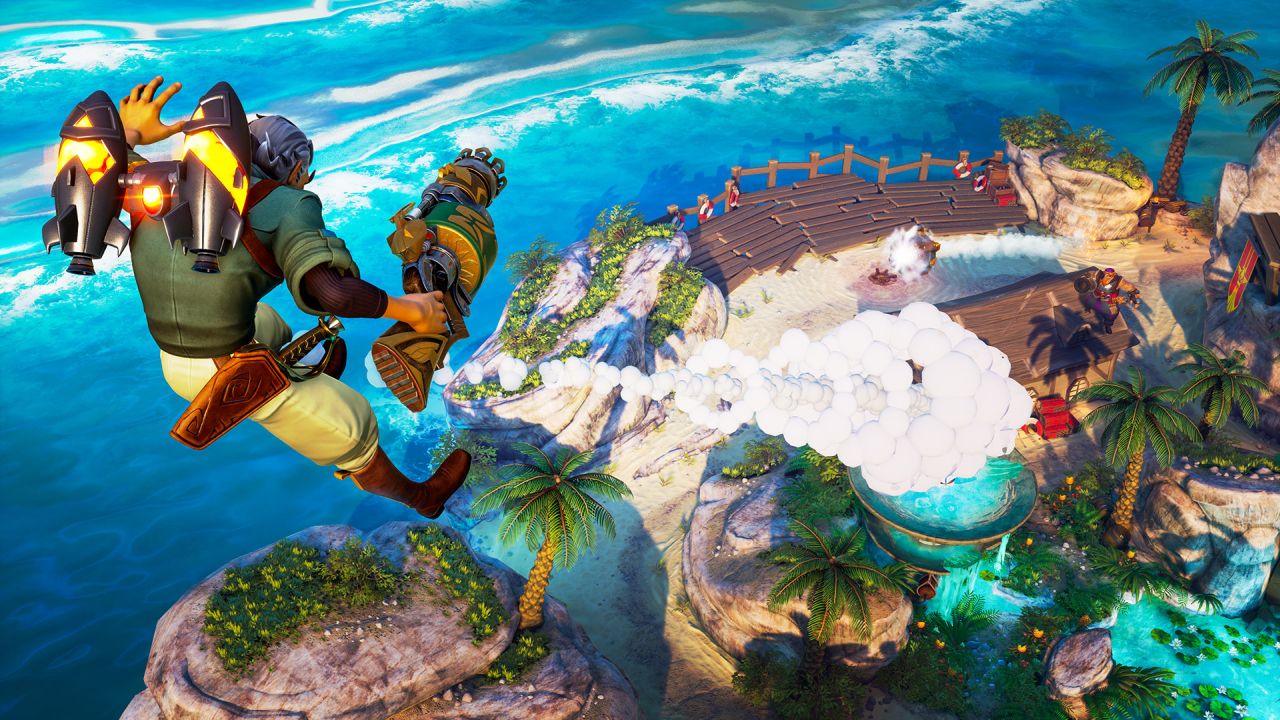 Even when they take us off the map there is no death as such on a visual level, although there is on a gameplay level: for a few seconds, we fly over the level until we land again at the respawn point of our team, although this short period of time can take the opportunity to coordinate with the other two colleagues. Even so, there are ways to avoid this situation, such as the dodging of rockets that all the characters have and the multiple elements of each level to avoid falling into the void: platforms to save us from death at the last moment, coverage of all kinds to avoid that missile that was going to take us off the map, and of course, rocket jumping.
Even when they take us off the map there is no death as such on a visual level, although there is on a gameplay level: for a few seconds, we fly over the level until we land again at the respawn point of our team, although this short period of time can take the opportunity to coordinate with the other two colleagues. Even so, there are ways to avoid this situation, such as the dodging of rockets that all the characters have and the multiple elements of each level to avoid falling into the void: platforms to save us from death at the last moment, coverage of all kinds to avoid that missile that was going to take us off the map, and of course, rocket jumping.
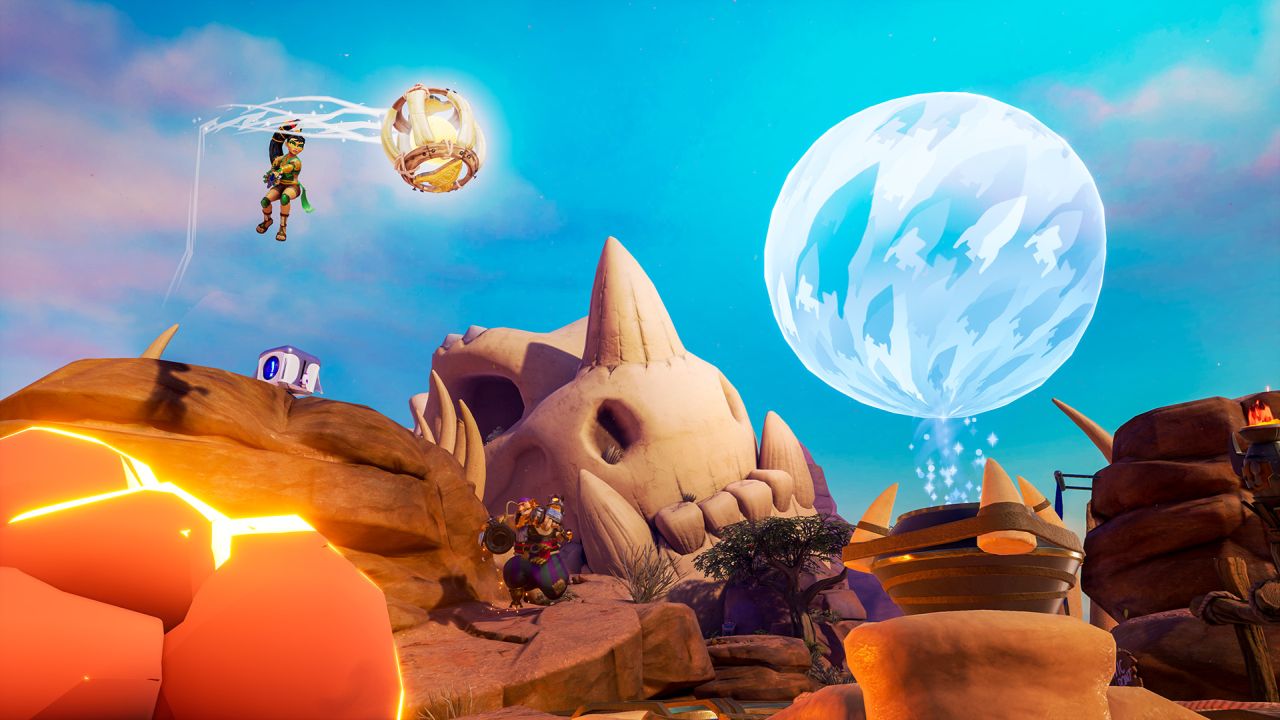 Missiles are not an essential tool to move: the stages are full of catwalks, bridges, platforms and upper roads that fly over the level or pass under it; In addition, all the characters have triple jump, something that makes the commitment to the mobility of this title very clear. But as the games continue and we learn the maps, rocket jumping will be a fundamental tool: to climb at full speed through the scenarios and attack our objectives from the air; to save us from that fall at the last minute; and in the most skilled hands, even to dodge the rockets of the adversaries. Its importance is more than clear from the beginning since it occupies a privileged place in the tutorial with which the game begins and where they explain that our own projectiles do not hurt us, but their weight is not really noticed until we start to fiddle with this mechanic or, like us, see other players moving in crazy ways with this technique.
Missiles are not an essential tool to move: the stages are full of catwalks, bridges, platforms and upper roads that fly over the level or pass under it; In addition, all the characters have triple jump, something that makes the commitment to the mobility of this title very clear. But as the games continue and we learn the maps, rocket jumping will be a fundamental tool: to climb at full speed through the scenarios and attack our objectives from the air; to save us from that fall at the last minute; and in the most skilled hands, even to dodge the rockets of the adversaries. Its importance is more than clear from the beginning since it occupies a privileged place in the tutorial with which the game begins and where they explain that our own projectiles do not hurt us, but their weight is not really noticed until we start to fiddle with this mechanic or, like us, see other players moving in crazy ways with this technique.
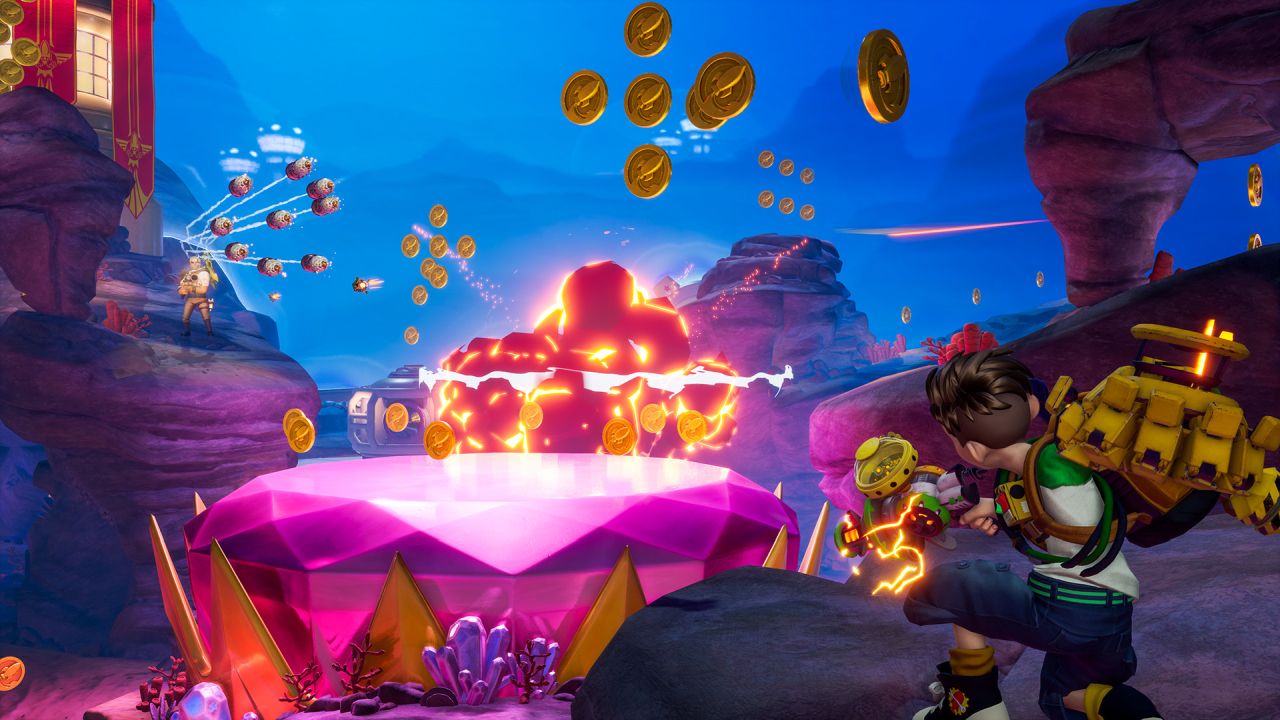 These two systems, movement and the particular way of dealing with the player’s life are the main responsibility for ensuring that each game of Rocket Arena is carefree, that we have fun, even if we are losing by a landslide because the simple fact of managing the game is satisfactory; and that a playable depth is appreciated, a domain of the game to aspiring to, very high and that is not oriented – at least, not only – to our reflexes and our abilities to aim, but mainly in learning to dodge, jump and move quickly taking advantage of what surrounds us. Their aesthetics and game modes also contribute to that feeling of direct fun.
These two systems, movement and the particular way of dealing with the player’s life are the main responsibility for ensuring that each game of Rocket Arena is carefree, that we have fun, even if we are losing by a landslide because the simple fact of managing the game is satisfactory; and that a playable depth is appreciated, a domain of the game to aspiring to, very high and that is not oriented – at least, not only – to our reflexes and our abilities to aim, but mainly in learning to dodge, jump and move quickly taking advantage of what surrounds us. Their aesthetics and game modes also contribute to that feeling of direct fun.
Grand mixture of game modes
The main mode of Rocket Arena is Harassment and Takedown, a Manual Team Kill: the objective is to take the opposing team 20 times from the stage in the 7 minutes of the game. It is the most direct way, also the one that has given us more tense moments, but it is by no means the only one.
Our favourite is still Treasure hunt, perhaps because of the originality of its proposal. Here a chest appears in the middle of the stage. The team that holds it earns coins over time and therefore whoever wears it is the main target. Once the coins in the chest are used up, the entire stage is filled with coins that are collected as if it were a three-dimensional platform. Obviously, the team with the most coins wins before time runs out. It is simple, but it also creates very heated situations. Playing with the open mic opens up many strategic options, but with strangers, it can be too chaotic because some focus on trying to knock down the opponent while leaving aside the coins.
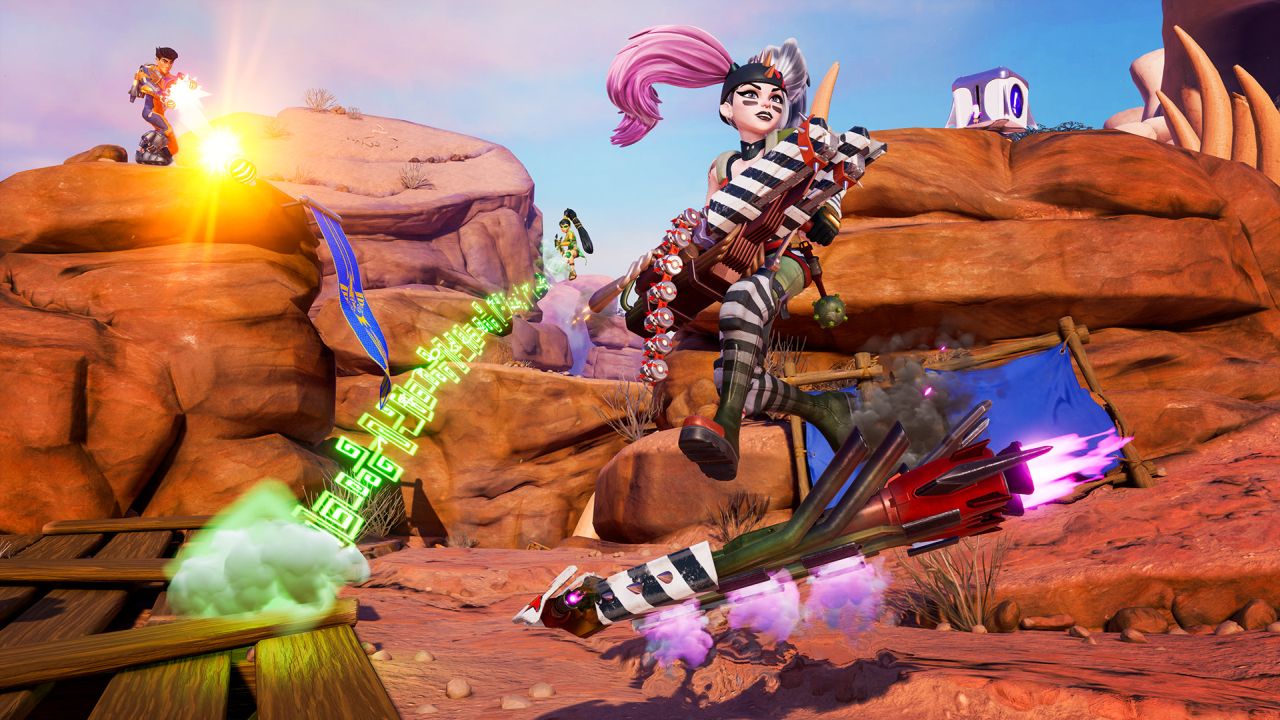 Something similar happens with Pepinazo, a twist to the King of the hill of a lifetime. Here dots appear alternately in various areas of the map and teams struggle to control them. The winner is the one who has controlled the most zones. The difference is that the area appears after a huge rocket has landed at that point, killing everyone it has caught there. On paper it is a good idea: the teams would face off in the area where the area to be controlled will appear, and there would be situations in which everyone would die if they were not on the loose. The reality is that players tend to be very careful not to approach that place and, therefore, the originality of that Pepinazo does not have a visible effect.
Something similar happens with Pepinazo, a twist to the King of the hill of a lifetime. Here dots appear alternately in various areas of the map and teams struggle to control them. The winner is the one who has controlled the most zones. The difference is that the area appears after a huge rocket has landed at that point, killing everyone it has caught there. On paper it is a good idea: the teams would face off in the area where the area to be controlled will appear, and there would be situations in which everyone would die if they were not on the loose. The reality is that players tend to be very careful not to approach that place and, therefore, the originality of that Pepinazo does not have a visible effect.
What still seems to us quite chaotic after having played more since the preview is the Rocketball mode, which works half like a Rocket League: the ball bounces around the stages in a crazy way, and we can pick it up and pass it to our teammates. Perhaps it is due to the laziness of the companions or it may be because not all the maps are well designed for this mode, very different from the others, but here it seems that you gain more by luck than by skill. RoboRocket War has not convinced us either, a horde mode where the objective is to destroy waves of robots before time runs out: it is too easy, very repetitive and is played on the same 10 maps as for the rest of the modes. Promise that in the future they will introduce different difficulties and other variants, but right now it is the vaguest of the whole. Of course, it is more than a good way to test the abilities of the different characters.
Character Roster
Rocket Arena arrives with 10 heroes and an additional one that will premiere on the launch day of the first season on July 28. The main grace in-hero shooter, beyond the strategic options that it opens, is for each player to find a character and a style of play that they like, an avatar with which they can feel identified or for which they feel a certain attraction. The design of the characters, perhaps because of that combination between the colouring of Fortnite and the rounded shapes of Pixar, we did not quite enter through the eyes, there is a certain lack of personality. But once at the controls of each of them, just the opposite happens.
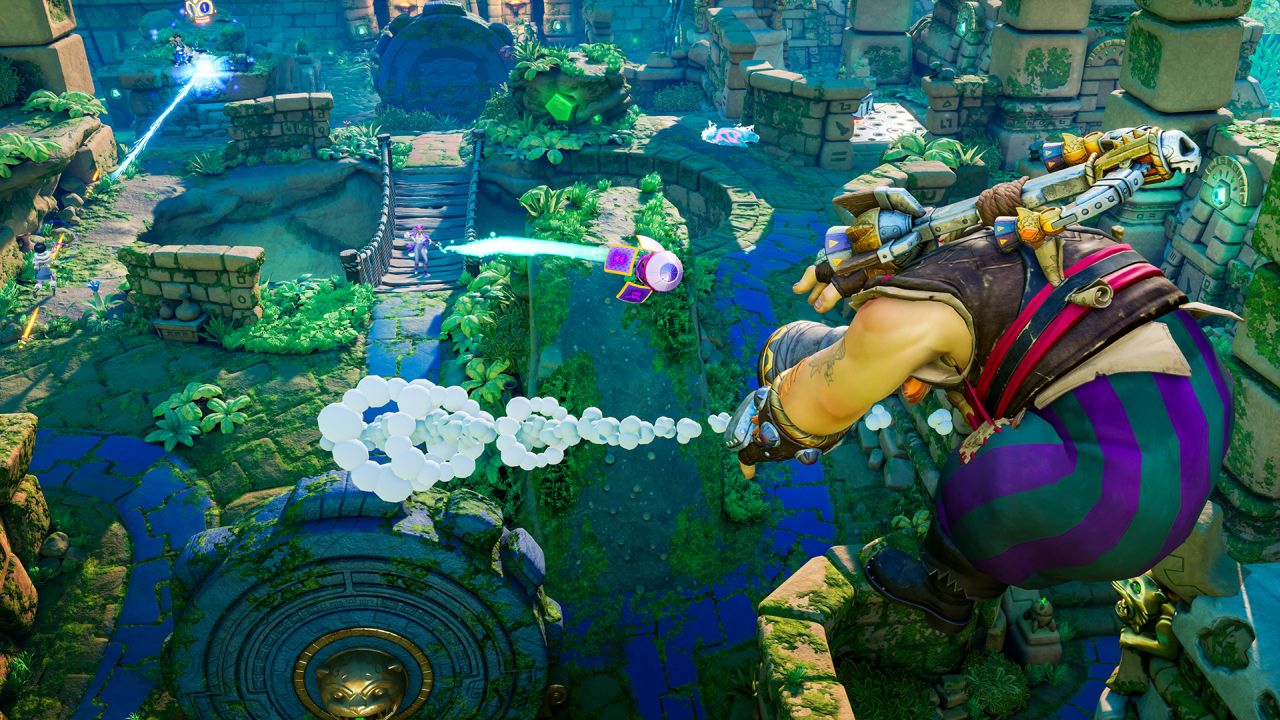 Of course, all heroes fire rockets, but what makes them special is not their abilities, which are quite important, but how the projectiles differ from each other. There are those that do more damage, there are those that recharge, there are those that work almost like a machine gun and others that behave as if they were a sniper. But each requires aiming differently, calculating the rocket’s path, and learning its speed – something that ends up happening mechanically. And because of this, playing with Rev, Kayi or Flux feels quite different.
Of course, all heroes fire rockets, but what makes them special is not their abilities, which are quite important, but how the projectiles differ from each other. There are those that do more damage, there are those that recharge, there are those that work almost like a machine gun and others that behave as if they were a sniper. But each requires aiming differently, calculating the rocket’s path, and learning its speed – something that ends up happening mechanically. And because of this, playing with Rev, Kayi or Flux feels quite different.
Also, there are different abilities. In addition to the aforementioned dodge, there are two different magics. One is the alternate shot: from zooming with a sniper to shooting water balls that chase enemies, to throwing explosive maces. The other, usually with a faster reload time, is usually a more powerful power: a hook that allows us to move freely around the stage or grab enemies, make ourselves momentarily invisible, teleport and fly freely across the map are some of them.
To the differences of each hero, we must add the influence of the trinkets, three modifiers that we can assign to the characters to reduce the recharge time of skills, to increase the invulnerability time after reviving and to be faster moving on firm ground, to mention a few of the many available. This opens the door to creating builds that either understand the advantages of a character or that mitigate their disadvantages.
 These trinkets are also the progression system of the game – in addition to the ranked games, the battle pass per season and the unlockable cosmetics of each character – since they are unlocked as we play, and the ones we already have level up if we have equipped, increasing the advantages granted; yes, in the ranked they are all unlocked and capped at level one to avoid unfair advantages. We understand the reason for their existence, as they are an element that encourages you to continue playing to unlock something, but we believe that they provide unnecessary complexity in a game well balanced between accessibility and depth; and with these things, there is always the risk that they are designed very advantageous builds that end experimentation.
These trinkets are also the progression system of the game – in addition to the ranked games, the battle pass per season and the unlockable cosmetics of each character – since they are unlocked as we play, and the ones we already have level up if we have equipped, increasing the advantages granted; yes, in the ranked they are all unlocked and capped at level one to avoid unfair advantages. We understand the reason for their existence, as they are an element that encourages you to continue playing to unlock something, but we believe that they provide unnecessary complexity in a game well balanced between accessibility and depth; and with these things, there is always the risk that they are designed very advantageous builds that end experimentation.
Audiovisuals
The first thing we want to make clear is that on a technical level Rocket Arena works like a shot (or like a rocket): on a mid-range computer we have played at more than 100 fps with all the settings at maximum, and from Final Strike Games they promise which will work at 60 frames per second on all versions of Xbox One and PlayStation 4. It may seem a small thing considering the animated style of the game, but there are times when everything is full of effects, explosions and characters moving from one place to another at full speed and it is surprising that everything goes so smoothly. By the way, now that we bring up the console versions: there will be cross-play with all platforms here, and it’s up to the players to disable it.
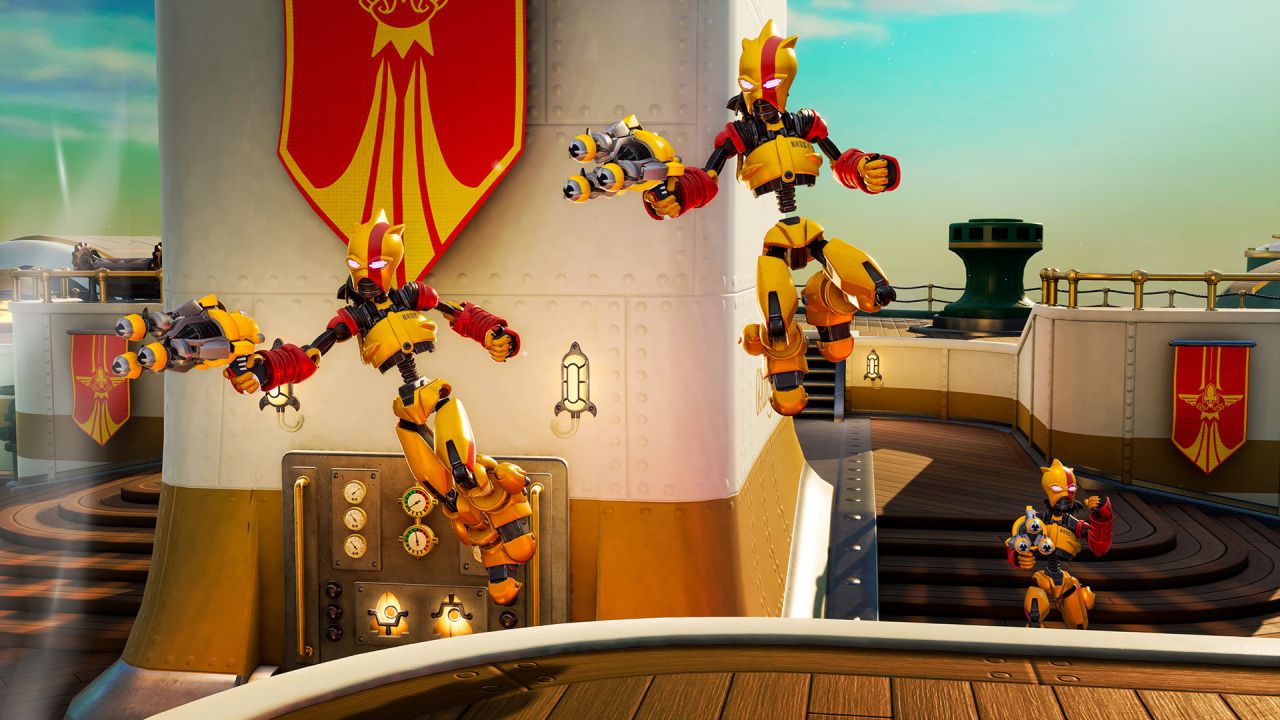 That said, in Rocket Arena you can appreciate a careful game, where a lot of effort has been put into all the elements: from the clean and accessible interface to the sounds that allow us to clearly identify what type of rocket has been fired at us; from those maps that seem taken out of animated films to those musical themes that convey sympathy in every note. But what we think is a commendable job are the character animations: there is a heroine who shoots projectile cards and thanks to her movements those attacks feel forceful; there is a girl who becomes invisible and at that moment the screen is covered with icons and inverted colours, and a man carries a small dinosaur on his shoulder that interacts with him in an adorable way.
That said, in Rocket Arena you can appreciate a careful game, where a lot of effort has been put into all the elements: from the clean and accessible interface to the sounds that allow us to clearly identify what type of rocket has been fired at us; from those maps that seem taken out of animated films to those musical themes that convey sympathy in every note. But what we think is a commendable job are the character animations: there is a heroine who shoots projectile cards and thanks to her movements those attacks feel forceful; there is a girl who becomes invisible and at that moment the screen is covered with icons and inverted colours, and a man carries a small dinosaur on his shoulder that interacts with him in an adorable way.
Rocket Arena is one of those games that feels like a blockbuster finish without using photorealism. And we are talking about a team of approximately 50 people.
Final Thoughts
It’s easy to miss a new multiplayer shooter when the genre is so congested with great games, many of them free. Rocket Arena is a title that is launched at a reduced price and that will be supported, in addition to new modes, characters and events available without dropping a single euro more, by battle passes focused on cosmetics (each one will give enough rewards to be able to get the next one for free). It’s a risky move in this totally free era, but even so, we can’t stop recommending it, that you give it a chance, even if it’s trying it out at Origin Access.
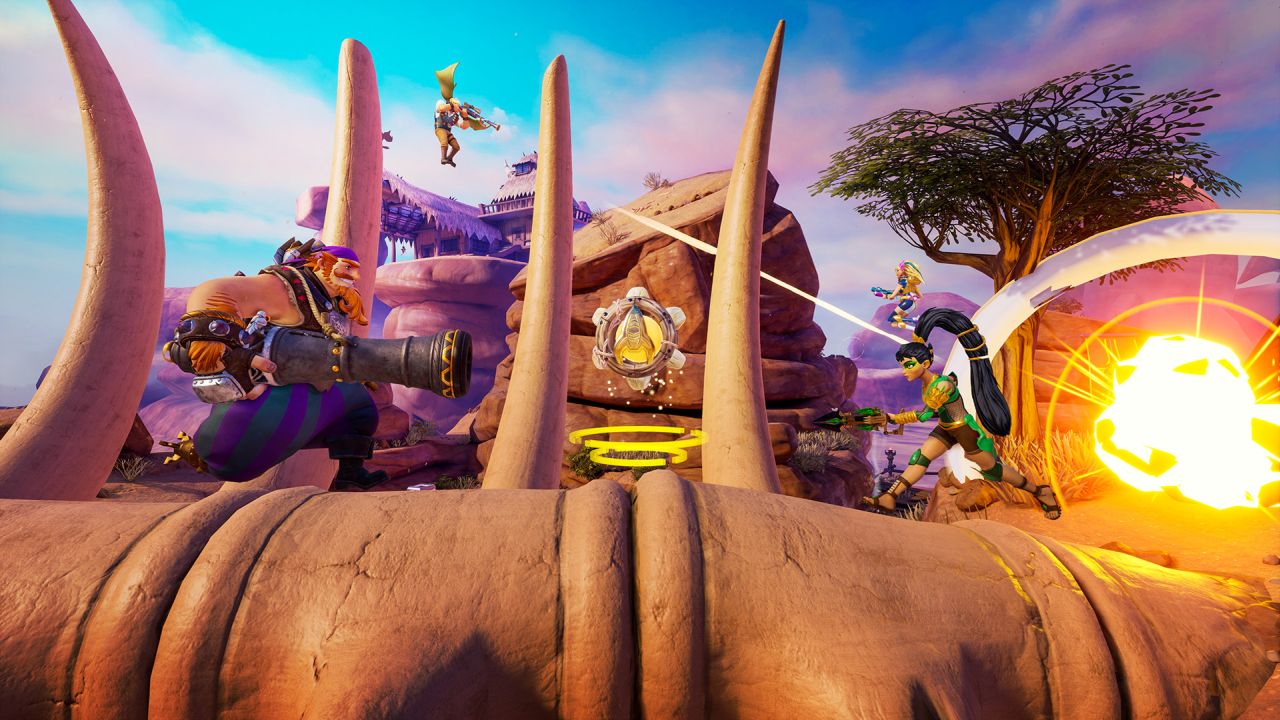 The effusive recommendation is not due to the fact that it is a perfect game, far from it: the heroes lack visual charisma, not all game modes are well done and there are great maps and others where too much chaos is generated. But this is a third-person shooter that does things very different from its genre peers, that feels fresh, that is very accessible and fun, that overflows with sympathy and that makes shooting, moving and using different skills very satisfactory. It’s hard for it to become a phenomenon like Overwatch, a pop culture hub like Fortnite, or an esports star-like Valorant. Nor it needs to be. Rocket Arena is just plain fun.
The effusive recommendation is not due to the fact that it is a perfect game, far from it: the heroes lack visual charisma, not all game modes are well done and there are great maps and others where too much chaos is generated. But this is a third-person shooter that does things very different from its genre peers, that feels fresh, that is very accessible and fun, that overflows with sympathy and that makes shooting, moving and using different skills very satisfactory. It’s hard for it to become a phenomenon like Overwatch, a pop culture hub like Fortnite, or an esports star-like Valorant. Nor it needs to be. Rocket Arena is just plain fun.
We prepared this review playing the PS4 version of the title with a digital code provided by Electronic Arts




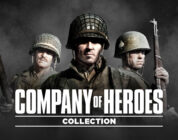
yWbSMRVYChfKZkJ
owLYfBCMqe
Juliat
I found this article both enjoyable and educational. The points made were compelling and well-supported. Let’s talk more about this. Check out my profile for more interesting reads.